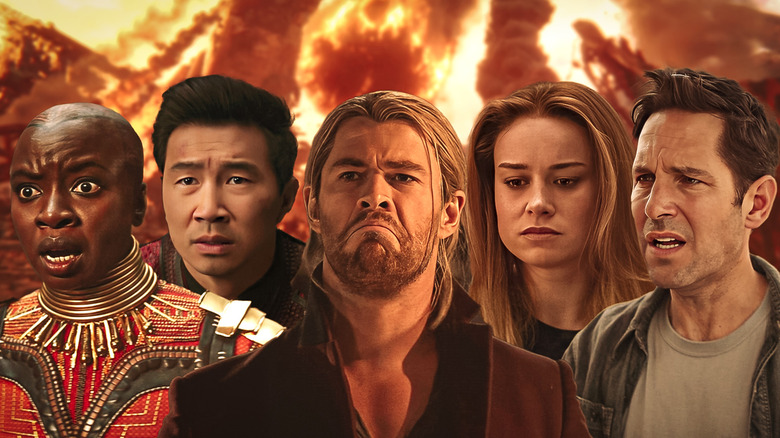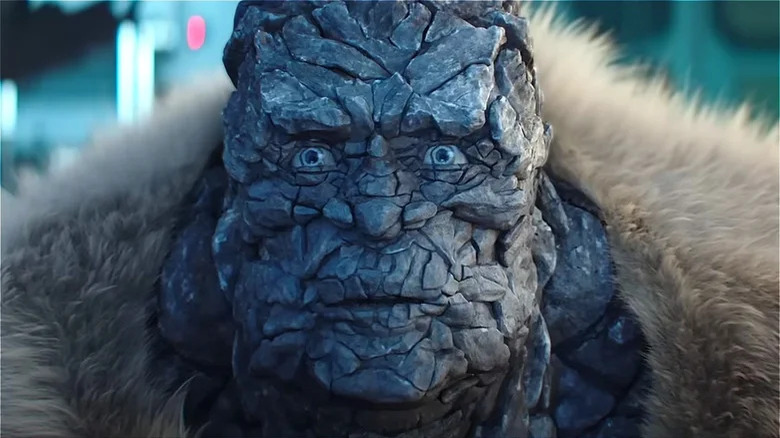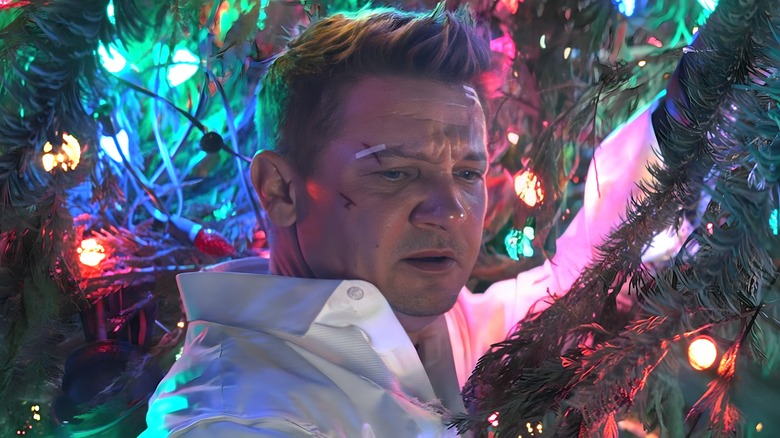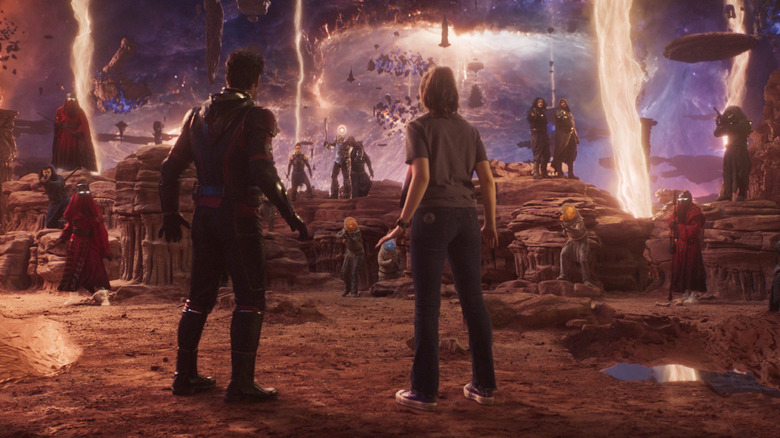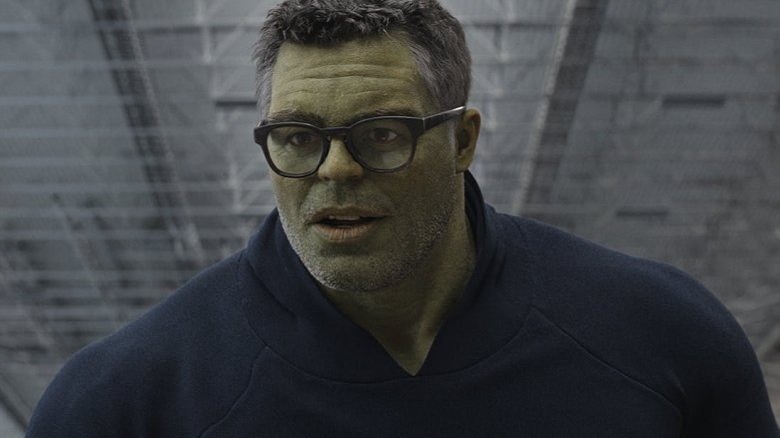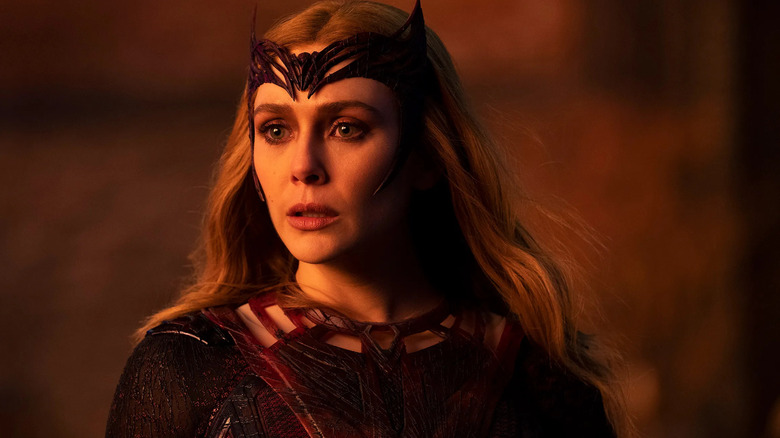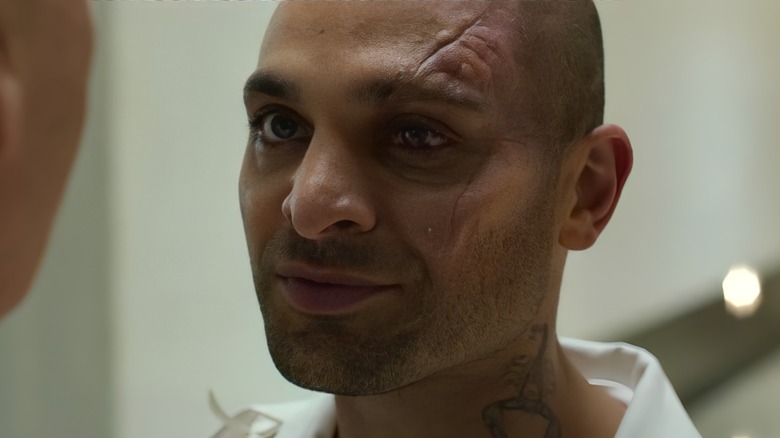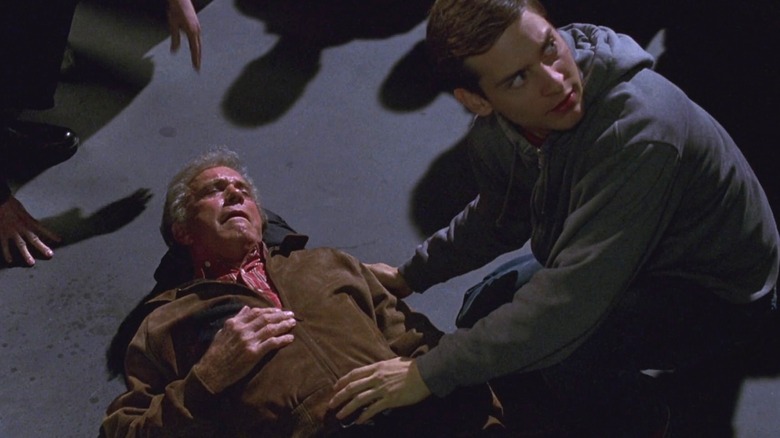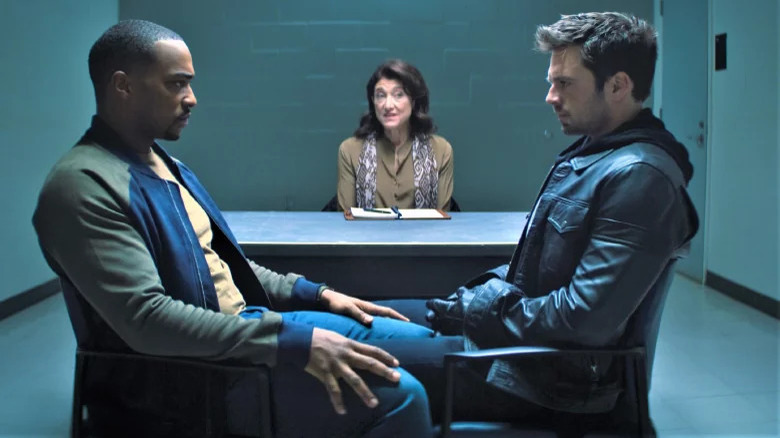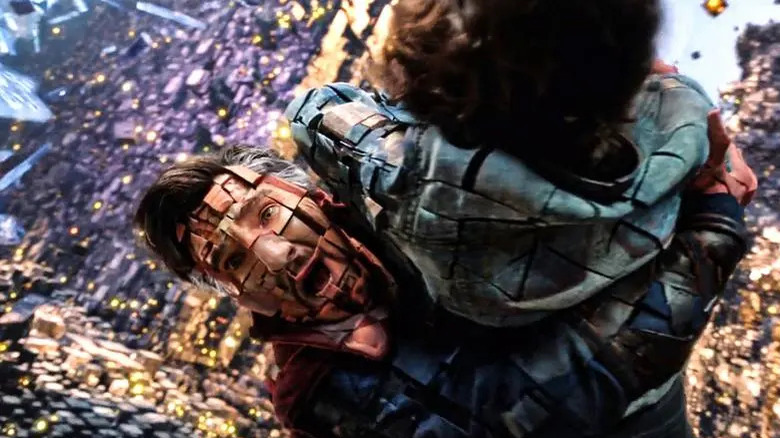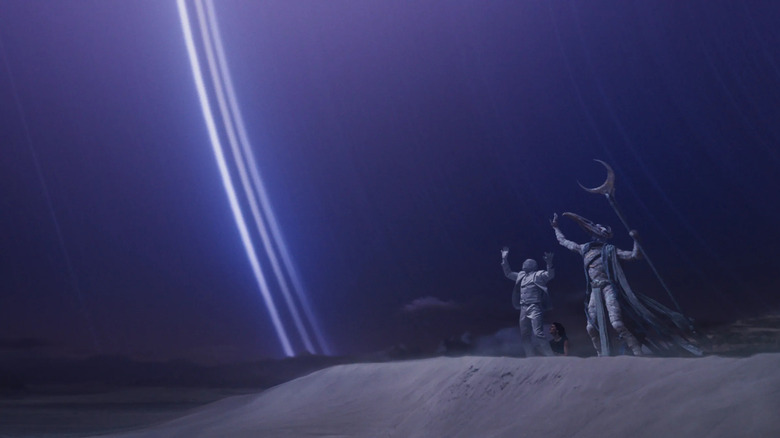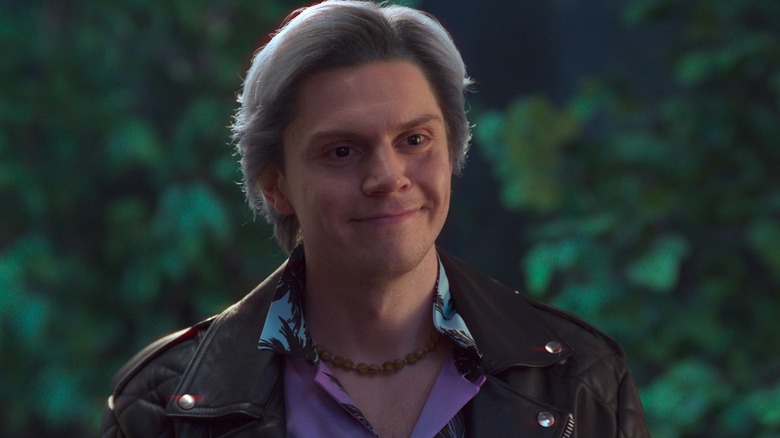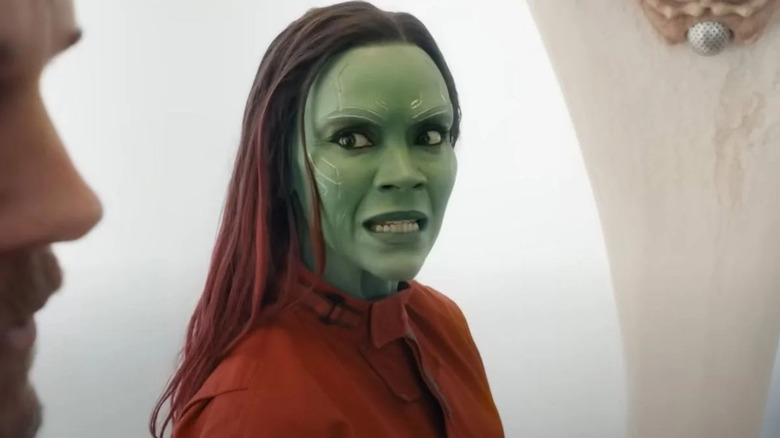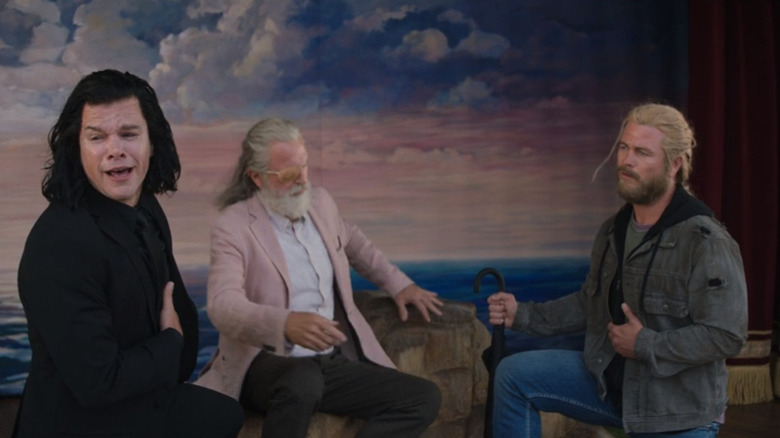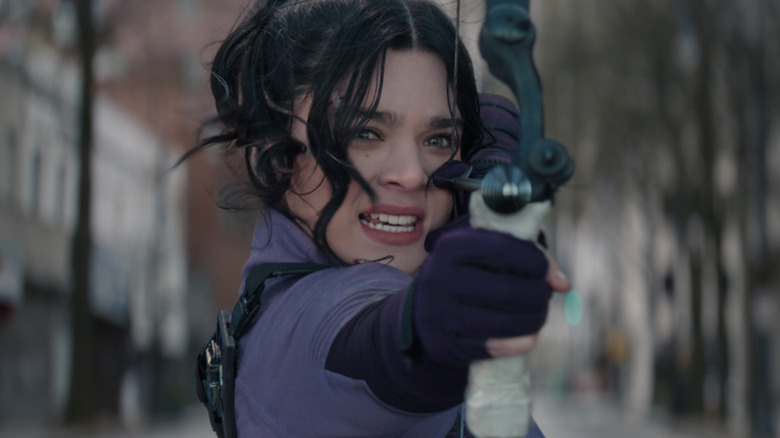Why Does The MCU Keep Doing These Things?
Almost every long-running franchise indulges in repetition, and the situation only amplifies when the product is as supersized as the Marvel Cinematic Universe.
To be fair, Kevin Feige's ongoing mission to mush every Marvel Comics property into a delicious multiversal stew was always going to have a few repetitive tropes — considering that every superhero has an origin story, and every superhero fights supervillains, and there are only so many ways to tell that tale. Of course, this is not necessarily a bad thing. "Iron Man" and "Doctor Strange" are basically the same movie, but it's okay because one is about Robert Downey Jr.'s character, and the other is about a different magical force.
However, the MCU has become a lumbering giant endlessly falling into tired situations. Sadly, the sprawling cinematic universe keeps repeating incredibly frustrating things so often that Thanos (Josh Brolin) would be tempted to throw the Infinity Gauntlet on the ground and storm off in exasperation. Is the MCU unaware that it's caught in a loop? Or is Marvel Studios unwilling to course-correct? Yes, we all love the MCU. But part of loving something involves recognizing what needs work, so here we are going to deep dive into all the nasty holes the MCU needs to fill.
The MCU loves to kill serious moments with dumb jokes
How would you feel if the most pivotal scene in your favorite movie or series ruined its dramatic tension with a ... "Yo mama" joke? If you're an MCU fan, this is all too familiar terrain. MCU projects seem allergic to drama, even when their plots desperately call for it.
By far, the worst offender is "Thor: Love and Thunder." Listing all the times Taika Waititi's film introduces a moving scene to then immediately make light of it would require describing the movie's entire plot — barring Gorr's (Christian Bale) scenes. Still, "Love and Thunder" wears its action-comedy status proudly on its sleeve. The same can't be said for several MCU projects that offset gripping scenes with weirdly-timed comedy.
In "Iron Man 3," Pepper Potts (Gwyneth Paltrow) falls to her apparent death and Tony Stark (Robert Downey Jr.) has to fight for dear life against the murderous Aldrich Killian (Guy Pearce); however, the drama devolves into a joke when the Mark 42 armor falls to pieces on the battlefield. "Avengers: Age of Ultron" reveals Ultron's (James Spader) debut with a villainous monologue, but the world-ending and information-siphoning A.I. stumbles as he forgets the word for children. Ego (Kurt Russell) transforms into David Hasselhoff during the dramatic reveal that he's responsible for killing Star-Lord's (Chris Pratt) mother. Korg (Waititi) delivers wacky commentary as the people of Asgard watch Surtur (Clancy Brown) destroy their homeland in "Thor: Ragnarok."
When you know to look for this trope, it's difficult to watch any dramatic MCU scene without subconsciously expecting it to devolve into an "I Think You Should Leave with Tim Robinson" sketch.
Marvel Studios' release schedule is packed too tightly
Remember when Phase 1 of the MCU had only six movies? That fact alone makes Phase 4 feels like a completely different franchise. By the end of Phase 3, it was easy to tell the big entries from the smaller ones. Iron Man, Captain America, and Thor-focused stories reigned supreme, with vitally supporting entries featuring Black Panther and the Guardians of the Galaxy. Of course, it helped that each Phase was anchored by an Avengers get-together. Sure, things got crowded by the end of Phase 3, but there was a structure that helped viewers know how it all fits together.
These days, that structure is nearly gone. The Disney+ era of Marvel series brought a tidal wave of content strong enough to knock stalwart fans off track. Remember when "Spider-Man: No Way Home" premiered in the middle of the run of "Hawkeye?" Altogether, Marvel Studios released five different TV series in 2021, amounting to 36 episodes of inter-connected (sorta) television. Plus, that was before we had "Moon Knight," "Ms. Marvel," and "She-Hulk: Attorney at Law" entering the ring.
There's just too much MCU content coming at us, and it's not spaced far enough apart for fans to digest it. The release schedule has been so packed that it's next to impossible to watch everything in the correct order, too. Going forward, Bob Iger has promised a focus on quality over quantity, but the effects of that policy remain to be seen.
Marvel's gotta stop overworking and underpaying VFX artists
Everyone and their mother has complained about lackluster special effects in the MCU. To be fair, there have been plenty of recent entries worthy of criticism, with "Ant-Man and the Wasp: Quantumania" being a particularly poor entry. But the issue is much larger and more complicated than merely "bad CGI." Just ask anyone who's worked as a VFX artist on a Marvel Studios film. Multiple reports in recent years from different VFX studios have painted a grim picture of MCU productions.
"Working on Marvel projects ends up being incredibly stressful, and this is a widely known issue throughout the VFX industry," one source told CNET in 2022. Multiple special effects houses will bid on contacts for different Marvels films, but when one wins, it's often not a victory for the people who work there. Seven-day, 80-hour work weeks aren't uncommon, so Marvel has become notorious in Hollywood for demanding last-second changes with unsustainable sprints to finish film effects in a crunch.
"It's pretty common to have people break down from the pressure of these shows," one source told IGN in 2022. "Even like the calmest people, I've had them call me on the phone just having full-on anxiety attacks because it's not work they can finish, and they don't know how to get over that hump." Not only do such working conditions border on being inhumane, but they also lead to a diminished product: Overworked animators don't have the time, stamina, or pay to put their creative all into making superior work.
The MCU keeps hiding crucial character development in-between projects
Due to the MCU's sprawling nature, it's expected that some timeline events happen between projects. However, it's honestly weird how many characters have gone through important and entirely off-screen developments that could have made much more exciting movies than the ones we actually got.
Bucky Barnes (Sebastian Stan) spends decades as a periodically-awakened Soviet super-operative between "Captain America: The First Avenger" and "Captain America: The Winter Soldier." Still, we catch mere glimpses of his tormented existence in these years — a true travesty, seeing as "The Falcon and the Winter Soldier" reveals that his adventures included an epic battle with Korean War-era super-soldier Isaiah Bradley (Carl Lumbly) in 1951. Steve Rogers' (Chris Evans) imprisoned Avengers faction escapes the Raft and spends years on the run between "Captain America: Civil War" and "Avengers: Infinity War." Marvel, this is the kind of stuff you show instead of casually mentioning it in the next movie.
Despite the stakes the MCU places on romantic relationships, it hates developing them on-screen. Much of Tony Stark's (Robert Downey Jr.) and Pepper Potts' (Gwyneth Paltrow) ups and downs happen between films. Star-Lord and Gamora (Zoe Saldana) and Vision (Paul Bettany) and Wanda Maximoff (Elisabeth Olsen) go from fledgling couples to ones off-screen before "Infinity War." Natasha Romanoff (Scarlett Johansson) and Bruce Banner (Mark Ruffalo) grow close between the first two "Avengers" movies. Oh, and while we're on the subject of the Hulk, nearly all of his character development takes place between his on-screen appearances — meaning he goes from a loner to an Avenger to a space gladiator to "Professor Hulk" almost entirely off-screen while several heroes with less outlandish arcs have received multiple films focused on their development.
The MCU keeps pushing Wanda to the dark side over and over...
Elizabeth Olsen is a phenomenal actor. Her character, Wanda Maximoff, received her MCU debut as a villain in "Avengers: Age of Ultron." But she's later sent on a fascinating and deeply layered odyssey during "WandaVision," where she discovers the height of her powers as the Scarlet Witch while inadvertently kidnapping an entire town. Then, in "Doctor Strange and the Multiverse of Madness," she's a really mean mom who will murder and destroy everything and everyone in existence so she can see her "kids" in another multiverse.
Yes, it makes some sense to start Wanda as a villain who eventually sees the light. But in "WandaVision," the turn that reveals Wanda as a villain is a legitimately surprising and well-constructed twist. "Multiverse of Madness," though, takes Wanda's character and steamrolls it, making her a one-dimensional baddie who literally won't hear reason because her children are her sole focus. On paper, this isn't terrible, but in practice, it's awful — Wanda is a completely irrational and overpowered antagonist. She ends up seeming devoid of all feelings. Then she maybe dies at the end, so if that's the end of Wanda's journey, that double sucks.
Olsen herself called out this repetition, albeit in the politest way possible, telling Vanity Fair, "It's a similar arc in 'Multiverse of Madness' that it is in 'WandaVision [...] I proposed that to the writers who wrote 'Multiverse of Madness,' I said, 'Do you know what we're doing in 'WandaVision'? Have you seen it?' And no, they had not seen it because it wasn't finished yet. So I had to try and, I don't know, play it differently, right? I had to attack the same themes in order for it to be interesting for me, and potentially for the audience."
Olsen is always fabulous, and her character is one of the MCU's best, but her arc needs to stop going in circles. Wanda shouldn't end up slotted into the villain role because the MCU doesn't know what else to do with her.
The MCU's beloved post-credit setups aren't paying off anymore
These days, it's common for major franchises to add post-credits scenes to their releases. In past films, this buzzy move used to set up stories for future entries and brought new characters into the mix. The MCU understands the power of a strong post-credits cameo better than most franchises. However, the studio is also guilty of forgetting about some of them afterward.
Hercules (Brett Goldstein) and Baron Mordo (Chiwetel Ejiofor) are two victims of this unfortunate trend. The former is introduced in "Thor: Love & Thunder" as a possible future rival of the titular Norse god, but he hasn't been seen or mentioned since his cameo in the film's post-credits sequence. Now, Hercules has the excuse of being somewhat recent — but Mordo? He seemed destined to fulfill his destiny as Doctor Strange's archenemy in a post-credit scene back in (wait for it) 2016. A variant of Mordo appears in the second Doctor Strange. Our Mordo, though? He's casually referenced as having tried to kill Strange in the past. Considering how intense his villainous debut was, that's a major letdown.
The biggest loss right now, though, is the Scorpion. In the post-credits sequence for "Spider-Man: Homecoming," Mac Gargan (Michael Mando) indicates that he wants to make an example out of titular the web-slinger, suggesting his alter ego, the Scorpion, will enter the fray. What's Gargan been doing since then, particularly when Peter's identity was made public in "No Way Home?" Yes, the MCU has lots of characters to service, and it does a better job than most franchises. But if these post-credit teases are going to mean anything, they need to pay off down the line.
The MCU's bizarre phobia of Uncle Ben
When Tom Holland's Spider-Man first swung his way into the MCU, the franchise elected to skip past several major parts of the character's origin story, including Uncle Ben's death. At the time, it was a decision that made sense. General audiences knew the basic beats of Spider-Man's backstory, so why show it again? As time has gone on, however, it has become clear that the MCU has a strange aversion to mentioning Peter Parker's dearly departed uncle.
No, it's not like fans want to see the whole origin story, but not even mentioning Peter Parker's most pivotal life moment — the one that drives him to become a hero — is odd. Uncle Ben does exist within MCU's continuity: Peter uses a suitcase with his initials in "Spider-Man: Far From Home," and indirectly references him on several occasions. Despite this fact, the character is never mentioned by name (discounting Tobey Maguire's Spider-Man talking about his version in "Spider-Man: No Way Home"). Spidey's iconic "With great power, comes great responsibility" catchphrase is instead given to Marisa Tomei's Aunt May.
It's fine for the MCU to omit certain hallmarks of the Spider-Man mythos, but Uncle Ben's death is the defining character beat that makes Spider-Man ... well, Spider-Man! Right now, the MCU's treatment of Uncle Ben sits at an unhappy medium where the character's presence is somewhat felt, but audiences know next to nothing about this iteration of him, his death, or the role he played in inspiring Peter. He has grown into a bizarre hole in this Spidey's backstory.
The MCU timeline is getting increasingly obscured
On a narrative level, the MCU has been messy for years. (That tends to happen when you introduce a multiverse as the new central crux.) But parallel realities aren't the only reason the saga has been difficult to follow. The way that Marvel has managed its timeline in Phases 4 and 5 has been pretty confusing. No, we're not just talking about the actual time travel in "Loki" and dimension-hopping in "Deadpool & Wolverine."
The disconnection between different MCU projects has led to some uncertainty about when things actually take place. Since movies like "Shang-Chi" and "Eternals" and shows like "Moon Knight" and "Ms. Marvel" exist in such isolated spaces, it can be hard to tell how they relate to one another on a general timeline. Earth has gotten really, really cramped with the addition of so many new superheroes, making the never-ending slew of world-threatening crises challenging to untangle. Also, since very few of these new projects have spawned proper series like the "Captain America" or "Iron Man" series, they all kind of feel lost in time's vacuum.
The only consistent reference point of in the timeline seems to be the Blip from the end of "Avengers: Endgame." But even that piece has been referenced so many times that it's losing meaning. Every story since 2019 has dealt with the Blip in one way or another, making it feel like no time has passed. All we see are unrelated characters reacting to the same singular event, rather than a natural progression of new storylines.
Compared to EEAO, the MCU fails to embody the creative potential of a multiverse
Everyone's doing the multiverse thing. You could argue that the MCU started it, but at this point, it doesn't matter. The MCU is not doing it as well as other movies and TV shows have been.
Ever since the multiverse came into play in the MCU, things have been unnecessarily convoluted and confusing. At the same time, every dramatic stake has been lowered. It feels like it no longer matters if a character died or a world is destroyed because there's another character or world in another universe to take its place — and the past can simply be adjusted if necessary. Instead of using the multiverse to fully explore these heroes, villains, and everything in between, the MCU's multiverse feels like a life raft for when writers back themselves into a corner.
How can they fix it? Every writer working in the MCU should simply watch "Everything Everywhere All at Once" — if they haven't already. The best multiverse movie to come out in 2022, this Oscar-winning film takes the concept of multiple universes and creates a fully human, grounded, and deeply emotional story around it. Michelle Yeoh's Evelyn Quan shows how a person can access the best and worst versions of themselves across every universe in existence. There's a right way to do multiverse stories: the MCU just isn't doing that.
The MCU is making us wait too long to see exciting new characters again
The Infinity Saga had a clear trajectory from "Iron Man" to "Endgame." Since that time, all hell has broken loose. We've had movies take place in the past, future, and present. Mastermind Kevin Feige will likely manage to bring everything together in a tentpole flick (or two) a few years down the road. But for now, chaos is the order of business.
Unfortunately, this doesn't just make things difficult to follow. Viewers are regularly introduced to new characters only for the MCU to put a pin in their stories — gathering dust while other characters are in focus. We saw Shang-Chi's (Simu Liu) origin story nearly two years ago. Haven't seen the fella since! Moon Knight (Oscar Isaac) got his acclaimed series that left things on a cliffhanger, but things are still uncertain regarding if and where he'll go next.
This doesn't even touch on the countless side characters, too. Cassie Lang (Kathryn Newton) is on hold. Adam Warlock (Will Poulter) and Phyla (Kai Zen) barely made a splash in "Guardians 3." Heaven knows when we'll see them next. We got to see Charlize Theron's Clea for two seconds — but are we going to see her again before "Kang Dynasty," considering she's supposed to eventually be Stephen Strange's wife? The worst part is that the playing field looks like it's going to get a lot more crowded before that particular army of Kangs shows up. If you like a new character in the MCU, you better be patient about seeing them again.
The MCU keeps bait-and-switching the hopes and dreams of fans
The MCU owes its audience quality storytelling. What it doesn't owe its audience is fan service. Some of the more vocal members of the Marvel community might demand it, and their voices might even gain traction online, but that doesn't mean that the studio is required to listen. So it's a little frustrating when the MCU decides to pull a bait-and-switch with fans' hopes and dreams.
Remember when "WandaVision" revealed that Evan Peters would reprise his role as Pietro Maximoff from Sony's "X-Men" franchise for the MCU ... only to later reveal that he was actually just some dude named Ralph Bohner? Or how about when "Doctor Strange in the Multiverse of Madness" cast John Krasinski as Reed Richards only to spaghetti-fy him within a handful of moments? Not to bash the Mordo treatment again, but "Multiverse of Madness" pulled this nonsense twice, actually, with "Doctor Strange" ending with a promise that Chiwetel Ejiofor's Baron Mordo would return in a big way, just for the sequel to only show a variant of him in three scenes. In fairness, it's better than what the MCU planned for Mordo (hint: it involves some light beheading).
The Marvel community desperately wanted to see Peters continue as Quicksilver, and they felt equally passionate about the idea of Krasinski becoming Mr. Fantastic. The MCU chose to acknowledge these hopes by dashing them in the meanest ways possible. No, it's not funny or cute, as it's just as tactless as when Zack Snyder killed Jimmy Olsen in "Batman V Superman." At least, Marvel wised up and let Mordo live. But with "Deadpool 3" on the horizon, the potential for more mean-spirited "X-Men" cameos is never far away ...
The MCU keeps chickening out about character deaths
The comic book world is notorious for its inability to truly kill off characters. Everyone and their mother have been killed and brought back in an endless procession of morbid storytelling.
So, yes, the MCU is better. The more-or-less singular story arc of Kevin Feige's cinematic masterpiece has meant that if a character dies, they die. Yeah, there were occasional resurrections in the earlier phases, but these were usually red herrings (like Bucky surviving his fall to become the Winter Soldier) or unique scenarios, like Groot spawning his son. These more stringent parameters led to some heartbreaker partings — from key secondary characters like Phil Coulson, Heimdall, and Quicksilver to bigwig folks like Tony Stark and Natasha Romanoff.
After "Endgame," though, the MCU has become progressively more skittish about letting characters go. The multiverse is a big part of this. Gamora, for instance, technically "died," but they managed to weave her variant into the third Guardians flick easily enough.
But it goes beyond multi-dimensional cop-outs. Vision, for instance, is gone, but they made a carbon copy of him in White Vision. Both "Quantumania" and "Guardians of the Galaxy 3" managed to juggle a menagerie of characters without losing a primary hero. Even the recent killing of Maria Hill (Cobie Smulders) in "Secret Invasion" felt disingenuous. If the MCU is struggling with something at the moment, it's that it can't pull the trigger on meaningful major character deaths, which waters down its stakes at every turn.
The MCU has to stop mocking its most dramatic historical moments
If there's one thing the MCU has, it's the ability to pull off a memorable scene. From Captain America facing off against the Winter Soldier to Iron Man sacrificing his life to use the Infinity Gauntlet, there's no shortage of action-packed and emotional sequences throughout the franchise. So why does the MCU often seem so devoted to lampooning those moments?
Several recent projects include jokes that undercut pivotal events from the MCU timeline. Spider-Man cheerily recalls fighting a purple alien in space in "Spider-Man: No Way Home," while New Asgardians (whose forebears were massacred by Thanos) sell Infinity Scones in "Thor: Love and Thunder." Doctor Strange speaks with a surprisingly cavalier quality about Spidey's multiverse-shattering escapades in "Doctor Strange in the Multiverse of Madness." This all feels tonally dissonant, as if the MCU is building its world based on how fans reflect on past events, rather than how the characters would realistically remember them.
Perhaps the most egregious example of this issue is the recurring stage play joke. "Hawkeye" and "Thor: Love and Thunder" include sequences that feature ridiculous parodies of weighty MCU scenes, specifically the Avengers assembling for the first time and Odin's death. The joke is ostensible that these performances get a ton wrong about what happened and are insensitive, but they're undeniably played for laughs. It's good that the MCU isn't so self-serious that it can't poke fun at itself, but it could do with a bit more reverence for its memorable moments.
Marvel has to stop giving the Young Avengers the Black Widow treatment
The Marvel Cinematic Universe is famous for sprinkling Easter eggs and references to upcoming projects within its line-up. Eagle-eyed fans can make solid guesses as to what's coming down the pipeline with the right clues. (It doesn't take much to realize Marvel Studios wants a "Young Avengers" movie or TV show at some point.)
Many heroes in the Young Avengers have been introduced, like Kate Bishop (Hailee Steinfeld) in "Hawkeye," Cassie Lang (Kathryn Newton), America Chavez (Xochitl Gomez) in "Doctor Strange in the Multiverse of Madness," and several others. With so many young heroes on the docket, a "Young Avengers" adaptation seems like a no-brainer, but there's nothing about it on Marvel's schedule currently. The big team-up movies coming down the pipeline are "Avengers: The Kang Dynasty" and "Avengers: Secret Wars," but no "Young Avengers."
What's unfortunate here is that "Young Avengers" isn't exactly a project you can delay because, well, look at the title. They're called the "Young" Avengers for a reason. And it's clear Marvel hasn't learned anything from "Black Widow." While people clamored for her to get a solo movie for years, one didn't materialize until 2021, which was after Natasha (Scarlett Johansson) died in "Avengers: Endgame." It was too little too late, with the movie generally being received as a weaker MCU entry.
If Marvel doesn't get going on a "Young Avengers" movie (or even a special presentation on Disney+), they risk no one caring when it does come out. With so many Young Avenger introductions back-to-back, Marvel built up momentum for something special, but the studio needs to learn how to capitalize on fans' expectations before moving on to the next shiny thing.
